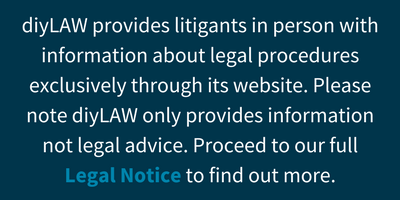Step 6: Defending Your Position
Wills and Probate
Acknowledgement of Service and Defence
A. In “Probate Claims’
Defendants must acknowledge service and file a defence within 28 days from the service of the particulars of claim(1). Upon acknowledging service, defendants must also lodge original testamentary documents with the relevant office and make a sworn statement (affidavit) about their awareness of testamentary documents (2) (just as claimants need to do when filing the claim form).
Defendants also have the option, which is not available in another type of claim, to make no positive case but to merely reserve the right to cross-examine the witness to the will (i.e. to ask questions of that witness in court)(3) . If the defendants follow this route, the court will not make an order for costs against them unless it considers that there was no reasonable ground for opposing the will.
A defendant who wishes to do more than test the validity of the will by cross-examining the attesting witnesses must set up their positive case by counterclaim (a claim made against the initial claimant) in order to enable the court to make an appropriate declaration as to the validity of the will.
Note that a failure to acknowledge service or file a defence on the defendants’ part does not lead to a default judgment in a probate claim. If one of several defendants fails to acknowledge service and the timeframe for it has expired, the claimant can proceed with the probate claim as if the defendant had acknowledged service. If no defendant acknowledges service or files a defence until the expiration date, unless the claimant applies to the court for a discontinuance of the claim, the claimant may apply for an order that the claim should proceed to trial (4) .
B. In Inheritance Act Claims
A defendant must file and serve acknowledgment of service and any written evidence within 21 days after service of the Part 8 claim form. The PRs of the deceased are necessary defendants to a claim under the 1975 Act and the written evidence filed by a defendant who is a PR must comply with paragraph 16 of Practice Direction 57(5) .
Limitation Periods
Defendants to the dispute can rely on different types of defences, including limitation periods and the principle of laches (explained below).
Generally, claimants must act as soon as possible in bringing their claim. For the different types of claims presented in the section above, there will be different limitation periods for bringing the claims. Beyond those periods, claimants will be barred from bringing their claim.
A. For invalid wills: there is no specific time limit in which to challenge the validity of a will. However, it is still recommended that claimants act as soon as possible, for instance by entering a caveat and preventing the will from being admitted to probate. If the claimant waits for the estate to be distributed, it will be more difficult and more expensive to recover the property and money from several different sources. In addition, the principle of ‘latches’(6) applies in this case: the more time passes, the more likely it will be that the Court will consider that the claimant consented to the validity of the will and thus waived the opportunity to dispute it.
B. For Inheritance Act claims: This type of claim must be brought within 6 months from the date of the grant of probate. A claimant can only bring an action under this ground beyond the limitation period by making an application to the court. Permission would only be granted in case of mitigating circumstances.
C. For promissory/proprietary estoppel: As with invalid wills, there is no limitation period for such claims but the principle of latches applies.
D. For executor or trustee disputes: A claimant should apply for the removal or replacement of a PR as soon as possible in order to avoid further damage to the estate. A claim against the PR for breach of their duties will be a claim for damages and this must be brought within 6 years of the date of the breach(7) .
E. For rectifications of wills: This type of claim must be brought within 6 months from the date of the grant of probate(8) .
Note that a claimant can bring an action outside the limitation period only by making an application to the court. The court will consider matters such as:
The length and reason for the delay;
The prejudice to the parties involved;
The extent, if any, to which the other side has assisted or hindered the claimant in identifying relevant facts;
The duration of any disability affecting the claimant after the cause of action accrued;
Whether the claimant has acted promptly and reasonably;
The extent to which medical or other expert advice has been taken.
(1) Part 57.4 CPR.
(2) Part 57.5 CPR.
(3) Part 57.7 CPR.
(4) Part 57.10 CPR.
(5) https://www.justice.gov.uk/courts/procedure-rules/civil/rules/part57/pd_part57#IDAZWG2.
(6) Re Loftus [2007] 1 WLR 591.
(7) See Limitation Act 1980: http://www.legislation.gov.uk/ukpga/1980/58.
(8) Section 20(2) Administration of Justice Act 1982: http://www.legislation.gov.uk/ukpga/1982/53/section/20.















